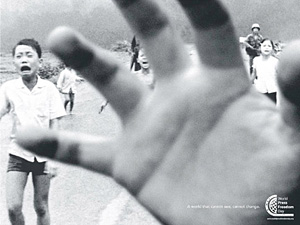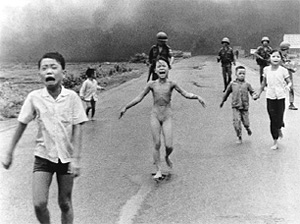 |
 |
 |
 Travel Writers' Resources | April 2007 Travel Writers' Resources | April 2007  
Stop the Press: Censorship on the Rise in Latin American Democracies
 Martha Farmelo - International Relations Center Martha Farmelo - International Relations Center


| A world that cannot see, cannot change

This what one of the world’s most famous ‘war images’ would have looked like, if censored.

It’s the picture of Vietnamese children running from a Napalm attack during the Vietnam war, but you can’t see the key figure in the photo which is a little girl running naked and bruised. | 
| Here’s the original, which influenced public opinion worldwide and remains, to this day, a striking image of who suffers the most from wars; innocent children.

Press freedoms and access to information must be monitored and strengthened. |
As freedom of the press and information spread throughout Latin America, offering citizens greater opportunities to inform themselves and empowering them to pursue social justice, national and municipal governments are stifling democracy through politically motivated use of advertising money and regulations to control the press and access to information.

When an Argentine activist asked a municipal press officer to justify spending taxpayer money on lavish ads in a local paper warning citizens not to abandon their dogs, the official clenched a copy of the paper in his hand and said: "We purchase this!"

With a simple declaration, the press officer confirmed what activists and journalists in the province of Tierra del Fuego understand all too well—government advertising is a subtle and effective way of controlling a supposedly free press.

By selectively spending and withholding advertising money, government officials can exercise control over headlines and content and even publish stories produced by the government itself. And government advertising accounts allow the state to reward papers that toe the government line - and discipline those that dare to question official conduct or policies.

In the province of Córdoba, the municipal government of Villa María cancelled all government advertising in 2004 to a local newspaper, Diario de Villa María, and refused to pay a debt of 16,000 pesos as apparent retaliation for articles critical of the mayor. The city also ceased sending the newspaper press bulletins and public service announcements on which local inhabitants rely.

As freedom of the press and information spread throughout Latin America, offering citizens greater opportunities to inform themselves and empowering them to pursue social justice, national and municipal governments are stifling democracy through politically motivated use of advertising money and regulations to control the press and access to information. These forms of control are components of indirect censorship systems in Argentina and elsewhere that violate international and regional free expression norms.

The extent of this indirect censorship was brought to light in December 2005 when the Open Society Justice Initiative (a program of the Open Society Institute, O.S.I.), and the Association for Civil Rights (Asociación por los Derechos Civiles, A.D.C.) published Buying the News: A Report on Financial and Indirect Censorship in Argentina. The report uncovered government use of advertising and regulations to censor the press in four provinces and at the national level. Indirect censorship can be particularly powerful in the provinces because local papers that provide residents with vital information often depend on revenues from government advertising to survive.

The analyses and recommendations in Buying the News have helped local organizations such as Citizen Participation in Tierra del Fuego develop new legislation to combat indirect censorship. For activists and government officials in Uruguay, the report has also been an effective means of generating momentum for legislation and reforms to safeguard press freedoms.

The many obstacles faced by the producers of Buying the News in obtaining government-held information about government advertising and press policies highlight a related issue common to many countries in South America - the lack of legal frameworks and adequate policies for providing citizens with public information.

Without access to public information - a basic democratic right - citizens and civil society groups have much difficulty holding governments accountable, fighting corruption, and obtaining information to help them pursue social justice.

In 1998 in Chile, the Terram Foundation requested public information about the environmental record of a company proposing a controversial logging project that appeared to threaten local biodiversity. The government denied Terram's request and all appeals have been dismissed. The case was eventually brought to the Inter-American Human Rights Court, a regional body that rules on government violations of the American Convention on Human Rights.

The Justice Initiative, A.D.C., and others presented "friend of the court" briefs shoring up arguments that Article 13 of the convention guarantees everyone's right to access information held by public authorities, and that the Chilean government violated this right. On Oct. 11, 2006, the court ruled that all people have a general right of access to government-held information and ordered the Chilean government to provide the requested information.

In Mexico, FUNDAR, a Mexico City-based anticorruption N.G.O. supported by the Open Society Institute's Latin America Program, obtained government-held information revealing that some 30 million pesos (approximately $3.6 million) of the 2003 national budget for H.I.V./AIDS prevention was diverted to one non-profit organization, Pro-Vida. Subsequent investigations showed that the government illegally favored Pro-Vida when distributing funds and that the N.G.O. cannot account for a large percentage of the resources it received. FUNDAR and its N.G.O. partners are monitoring the investigation, pushing for prosecution, and advocating for changes in the distribution of the national budget.

Unfortunately, success stories like those of the Terram Foundation and FUNDAR are the exception rather than the rule in Latin America. Only five countries have national freedom of information laws - a fact that has spurred O.S.I. and several N.G.O.'s in the region to initiate public education efforts to promote and strengthen this fundamental right.

"Access to public information sparked the most interest at a civil rights presentation in the impoverished municipality of Florencia Varela," said Mariela Belski, coordinator of the A.D.C.'s Access to Public Information Program. "Many parents were frantic about the lack of vaccinations for their children, and wanted to make public information requests right away."

A.D.C. and other groups are also working with officials by recommending measures on issues such as helping illiterate persons make requests, developing systems to avoid bureaucracy and keep track of inquiries, and training information officers on their obligations under the law.

As many countries in Central and South America continue to undergo democratic transitions, it is clear that press freedoms and access to information must be monitored and strengthened. Defending and expanding these basic rights will ensure that information critical to obtaining justice - whether it be to expose corruption, prevent environmental destruction, or improve public health - is available to all.

From the International Relations Center (I.R.C.).

Martha Farmelo of the Freedom of Expression Program of the Association for Civil Rights (Asociación por los Derechos Civiles) examines how governments are turning to indirect methods of controlling the press and public information as democracies spread through Latin America for the Right to Know section of the I.R.C. Americas Program. | 
 | |
 |



